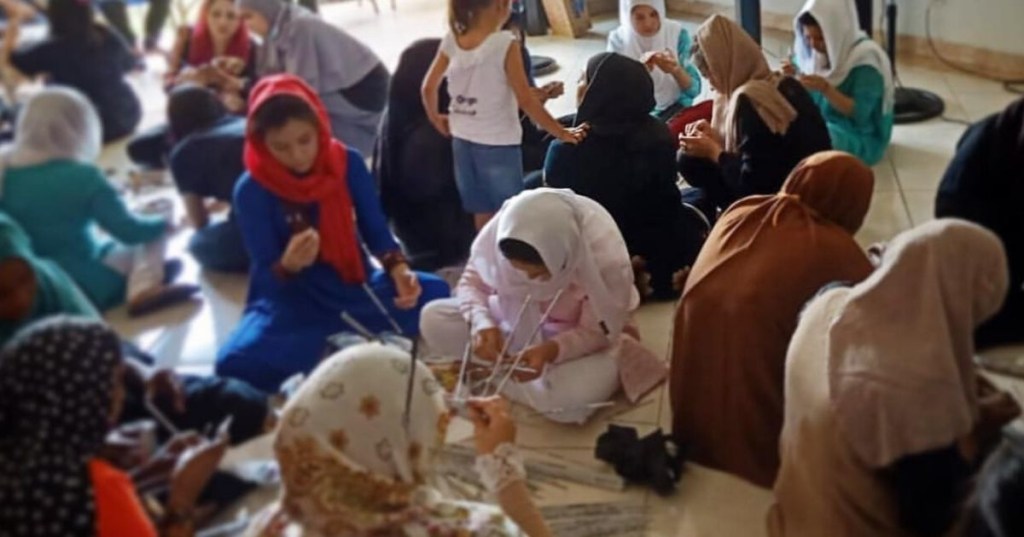I’m sitting in an outdoor eating area in Jakarta, sweat dripping down the back of my sundress, gazing at the young Muslim woman across the table from me. It’s a thousand degrees and humid, and I can’t figure out how she can look so comfortable in her black hijab and long sleeves.
The physical contrast between us feels emblematic, as does the table that separates us. It may as well be an ocean. Neither of us belongs in Indonesia, yet here we are—me as a middle-class American on an overseas work trip, her as an Afghan refugee trapped in a country that has no place for her.
I’m keenly aware that neither of us has chosen these identities, that it’s merely the happenstance of our births that has placed us where we are. My obvious privilege hovers over us like a disco ball, but neither of us mentions it.
As we begin chatting, a few things strike me immediately. Her voice seems soft, but only on the surface—below it runs a stream of strength and determination. I’m impressed by her excellent command of English, then stunned to find out she only started studying it in 2017. She is warm, honest, and smart as a whip. When she tells me she had planned to be a lawyer, I’m not surprised. This is clearly a young woman who can do anything she puts her mind to—a reality that makes her current life circumstances all the more heartbreaking.
I will call her Roya, though that’s not her real name. She doesn’t want me to publish any details about her personal life, partially for her own privacy and partially because she’s not here to talk about herself. She’s here to tell me about The Sisterhood—a supportive community for refugee women in Jakarta that she helped found.
To understand the full significance of The Sisterhood, you first need to know what it means to be a refugee in this place. Traditionally, Indonesia has been a brief stopover spot for refugees and asylum seekers making their way to safe third countries, but that has changed in recent years.
RELATED: The refugee crisis is daunting, but Canada offers an inspiring example of how to help.
Currently, 70 million people are displaced from their homes around the world, largely due to conflict—a number which has more than doubled in the past 20 years. The increase in refugees worldwide combined with countries like the U.S. and Australia slashing refugee resettlement numbers has resulted in a clogged drain situation in Indonesia. For years, refugees have streamed in, but barely trickled out.
Now, they are stuck here. In 2017, the UNHCR (the United Nations refugee resettlement agency) told the 14,000 refugees living Indonesia that their chances of being resettled in a third country are slim to none, and that they should plan on remaining in the country indefinitely. But since Indonesia is not a signatory to the 1951 Refugee Convention, it is under no obligation to provide protection to refugees. The government has decided that they are allowed to stay, meaning they won’t be deported back to their dangerous places of origin, but they have no legal status. That means they can’t legally work, can’t get a bank account, and can’t officially participate in the education system.
Refugees in Indonesia live in limbo, relying largely on charity, holding out hope for a life they may never see. Government and NGO funding is limited, and homelessness among the refugee population has been an ongoing concern in Jakarta. Immigration detention centers have been overrun by refugees who prefer detention to living on the street, causing severe overcrowding. Many live in shared housing and apartments funded by local religious groups and other charity groups.
Basic shelter and sustenance is one thing, but what about life beyond mere survival? I look at Roya, this extraordinarily bright and capable young woman in the prime of her life, and it seems impossible that she could have no options. She’s been here for five years already. What exactly are these people supposed to do? How do they maintain hope under such circumstances?
This is where The Sisterhood comes in.
All refugees experience insecurity and uncertainty, but refugee women face specific challenges in terms of personal safety, trauma, discrimination, and family responsibility. Recognizing this fact, a small group of refugee women, including Roya, decided to form a supportive community center for refugee women in Jakarta in 2018. Some outside partners have helped with some of the organizational logistics, but the now thriving community is entirely led by refugee women themselves.
Thanks to a local citizen who donated a former orphanage building to the women rent-free for three years, The Sisterhood has a beautiful facility where the women can gather. The center offers free classes (the first term included classes such as tailoring, Indonesian cooking, and self-defense), and a playroom allows mothers to bring their children with them. The space is also used for socializing, wellness programs, and basic services.
The founders make sure that the needs of the women The Sisterhood serves stay front and center, with regular evaluation and consultation. After the first term, the self-defense class was changed to yoga and mindfulness, based on attendee feedback. Computer skills, beauty, and basic English literacy classes are all currently on the docket. Occasional health and dental checkups are offered through the center, as well as dispersement of hygiene products and other necessities.
Opportunities for learning, skill-building, and emotional support are vital for refugee women to stay mentally and emotionally strong. But perhaps the most important element of The Sisterhood is the feeling of safety it provides for these women. Roya says refugee women don’t always feel safe even within the refugee community, much less outside of it. The Sisterhood gives them a place where they can feel safe and equal.
I ask Roya about mental health services for women at the center. Trauma is a common theme among refugees for obvious reasons, and women are most likely to be survivors of sexual violence and other atrocities. From my Western perspective, I wonder if bringing in counselors might be helpful, but Roya says the mental health needs are different for unsettled refugee women.
“We are not in a safe and secure situation yet,” Roya points out. She says that sitting down with a psychologist and going through their past trauma would be like scratching a wound that can’t heal in their current circumstances. Security has to come first.
Instead, focusing on learning and building skills in the present makes refugee women feel helpful and useful, says Roya, which helps with their mental state. And preparing for the future—even an uncertain one—helps them maintain hope, so that if or when they get a chance to resettle, they’ll be able to say, “I’m ready.”
Keeping a sense of hope is a lifeline for refugees, which explains the fire in Roya’s voice when she talks about what the UNHCR has said about their chances of resettlement. “They are trying to steal our hope,” she says. Refugees are constantly told to “be calm” and “be patient,” she says, but they are also told that they are essentially trapped there. The UN agency has said they’re just trying to be honest with the refugees in Indonesia, but Roya contends that kind of honesty isn’t helpful.
“I tell my friends that a visa is coming soon, even it if’s a lie,” she says, a sad smile crossing her face. “I love this sweet lie.”
Without hope of resettlement, the only choice refugees have is to resign themselves to a life with no sense of productivity, no opportunity to contribute to society, and no means of providing for themselves. That’s not a life, and why refugees in Indonesia have gathered at the grassroots level to provide education and support for themselves whenever possible.
I find myself enamored by the resilience and strength of the refugee women I’ve met here, but again, I have to check myself. Roya points out that people tend to see projects like The Sisterhood and the refugee learning centers in Jakarta doing wonderful work and get the impression that refugees here are doing well.
“It’s not that we’re doing well,” she says. “We are doing what we have to do to survive.” Under the circumstances, resilience and strength aren’t character choices, but survival mechanisms.
At the same time, by definition, refugees are survivors. Escaping danger in the first place requires a certain measure of courage, fortitude, and problem-solving. Surviving in a foreign country where you didn’t plan to stay and have no legal rights takes a whole other level of strength, creativity, and perseverance. The refugees I’ve encountered have capacities that put most of us to shame.
Roya and her fellow refugee women who created The Sisterhood are perfect examples. They are making the most of their situation and using constructive resilience to serve the needs of their community, despite severe limitations.
Throughout our conversation, I’m thinking about how absurd it is that the U.S. government is currently resettling the lowest number of refugees in our history. The refugees I’ve met are exactly the kinds of caring, productive, ambitious, and innovative people you want in a society. It’s nothing short of abject foolishness that we aren’t begging these people to come resettle in our country.
RELATED: America should be clamoring to take in refugees, and not just for humanitarian reasons.
Roya’s passion for helping her fellow refugees is summed up in something she wrote about the mission of The Sisterhood:
“We want to bring hope to refugees lives.
We want to keep their dignity up.
We want to help them tolerate every bad situation.
We want to remind them that even when life is dark it is not going to last.
We want to remind them it is not the time to give up.
As a refugee, I know the most important thing that can help people to stay positive is having hope. As Stephen Hawking said: ‘While there is life, there is hope.’ So there is hope for a better future for us. It is time to use our capacity and our ability to help each other thrive together side by side. Maybe we don’t have enough sources and enough experiences, but I am proud to say we are moving forward. We found the right path and nothing will stop us.”
As our conversation wraps up, I walk around the table to say thank you and goodbye, trying to balance professionalism with what’s pushing on my heart. I want Roya to know that I recognize the injustice of my unearned life of ease compared to her unearned hardship. I want her to know that I see and hear her struggle, even if I can’t possibly put myself fully in her shoes. I want to tell her I wish I could work miracles, walk across the ocean that separates us, tie a disco ball above her own head and watch her dance.
Instead I take her hand and thank her for sharing her thoughts, her story, and her experiences with The Sisterhood with me. Then I walk away, wondering how I’m going to do any of it justice.



























